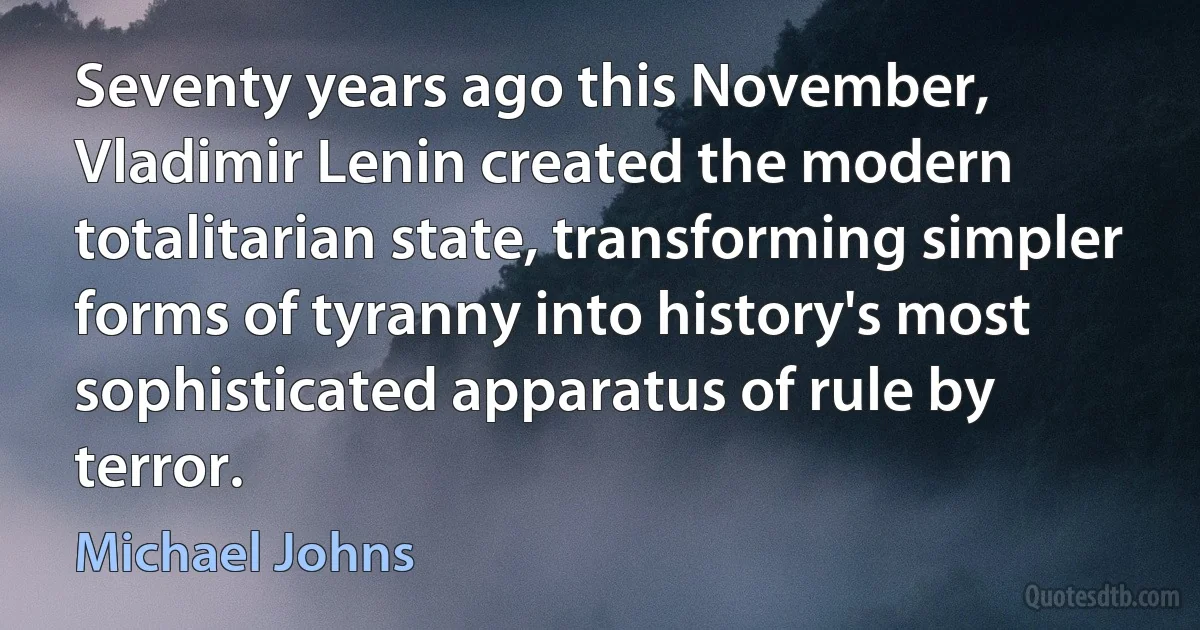Michael Johns quotes
The tragedy of Africa seemingly has no end. Viewing it from afar, the casual Western onlooker can be forgiven if the scenes begin to meld: Ethiopian famine in 1987, Somalian civil war and ensuing famine in 1992, and now Central Africa in 1997. The pictures and footage assume the role of media footnotes: snapshots of hopelessness, disaster, and death that seem as far away as the moon and as unrealistic as some science fiction film. Yet, like the African crises before it, the tragedy of Central Africa is very real and, in a global age, perhaps not as distant as some would like to think. With a foreign policy appropriately rooted in some sense of humanitarian decency, the Central African crisis will not be easily ignored by American policymakers. It screams for remedy.

Michael Johns
Ultimately, in its collapse, Laos was important because it proved the validity of the so-called domino theory, which preached that communism--once victorious in South Vietnam--would metastasize throughout the region. Laos, like Cambodia, proved the domino theorists correct. On August 23, 1975, just four months after Saigon's fall, communist Pathet Lao (meaning "Land of Lao") guerrillas entered the Laotian capital of Vientiane and seized control of the nation. It was an event that, while clearly destructive to American interests in Asia, served as something of a wake-up call to those American isolationists who had downplayed the regional threat of communism. It also ushered in a horrid era for this nation's 4.8 million people.

Michael Johns
What, exactly, is the cost of this inaction? Estimates of the total national cost of medical malpractice range from $20 billion to $45 billion annually. But this number hardly tells the whole story. There also is the more hidden cost of defensive medicine, including unnecessary testing and second opinions that send patients scurrying through processes that would not otherwise be ordered and deepen the financial burden of America's health care system by an estimated three percent of our country's total health care expenditures. Who ultimately pays these costs? Reckless doctors? Faceless insurance companies? Seldom mentioned, the totality of these expenses ultimately falls exclusively on the consumer, since each malpractice award translates ultimately to increased malpractice insurance premiums, which, in turn, translates to either higher health care costs, fewer physicians (with less competitive pricing pressure), or both.

Michael Johns
Up against the ropes in the Iran-Contra affair, Ronald Reagan should have come out swinging, announcing clearly that this government carries itself in the tradition of the Marquis de Lafayette, that freedom fighters will no longer be left to die in the jungle, like Brigade 2506 at the Bay of Pigs.

Michael Johns
While there are periodic calls from libertarians and others for the privatization or elimination of the program, given the first political opportunity to dramatically influence the Medicare program, a conservative White House and Congress sought to strengthen, not weaken, the program. To be sure, debates will linger about whether Medicare is too large or too small. Debates remain about the allocation of Medicare dollars. But December 8, 2003, demonstrated that there is no debate on this most fundamental fact: Medicare must survive.

Michael Johns


